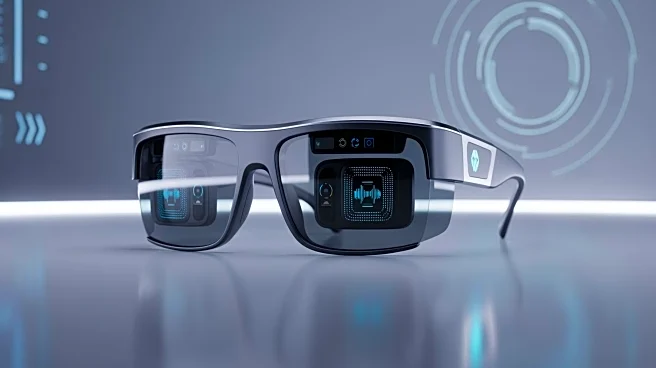What's Happening?
Meta has unveiled research augmented reality (AR) glasses that incorporate biometric sensors capable of measuring heart rate and other physiological data. This development is part of a broader trend where hardware, artificial intelligence, and wearables
are converging to create more context-sensitive AR experiences. The integration of biometric data into AR applications could enhance user interaction by providing personalized and real-time feedback. However, this advancement also raises significant privacy concerns, as users may be wary of sharing sensitive biometric information with AR applications.
Why It's Important?
The integration of biometric data into AR technology represents a significant leap in the capabilities of augmented reality, potentially transforming how users interact with digital environments. This could lead to more immersive and personalized experiences, benefiting industries such as healthcare, fitness, and entertainment. However, the collection and use of biometric data also pose privacy risks, as it involves sensitive personal information. Companies developing these technologies will need to address these concerns to gain consumer trust and ensure compliance with privacy regulations. The success of these innovations could influence the future direction of AR technology and its adoption across various sectors.
What's Next?
As AR technology continues to evolve, companies like Meta will likely face increased scrutiny from regulators and privacy advocates. The development of clear guidelines and robust security measures will be crucial to address privacy concerns and ensure user data is protected. Additionally, the market may see a rise in competition as other tech giants, such as Apple and Samsung, continue to innovate in the AR space. The next few years could see significant advancements in AR hardware and software, leading to wider adoption and new applications across different industries.
Beyond the Headlines
The integration of biometric data into AR technology could have far-reaching implications beyond immediate privacy concerns. It may lead to new ethical debates about the extent to which personal data should be used to enhance digital experiences. Furthermore, as AR becomes more integrated into daily life, there could be cultural shifts in how people perceive and interact with digital and physical environments. The long-term impact of these technologies will depend on how well companies balance innovation with ethical considerations and user privacy.














